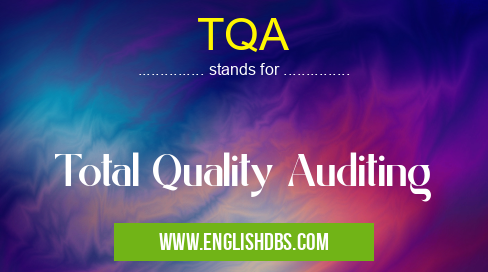What does TQA mean in AUDITING
TQA (Total Quality Auditing) is a comprehensive approach to auditing that focuses on evaluating the overall effectiveness of an organization's quality management system. It goes beyond traditional auditing practices by considering the entire organization, from top management to frontline employees.

TQA meaning in Auditing in Business
TQA mostly used in an acronym Auditing in Category Business that means Total Quality Auditing
Shorthand: TQA,
Full Form: Total Quality Auditing
For more information of "Total Quality Auditing", see the section below.
Key Features of TQA
- Systems-Based Approach: TQA audits the entire quality management system, including processes, procedures, and resources.
- Focus on Continuous Improvement: TQA aims to identify opportunities for improvement and enhance the overall performance of the organization.
- Customer Focus: TQA considers customer requirements and satisfaction as a key aspect of quality.
- Data-Driven Insights: TQA relies on data analysis to provide objective and evidence-based audit findings.
Benefits of TQA
- Improved Quality Performance: TQA helps organizations identify and address areas for improvement, leading to enhanced quality levels.
- Increased Customer Satisfaction: By focusing on customer requirements, TQA ensures that products and services meet or exceed customer expectations.
- Reduced Costs: TQA can help identify inefficiencies and waste, leading to cost savings and improved profitability.
- Enhanced Competitiveness: By adhering to best practices and industry standards, TQA helps organizations gain a competitive advantage.
Essential Questions and Answers on Total Quality Auditing in "BUSINESS»AUDITING"
What is Total Quality Auditing (TQA)?
Total Quality Auditing (TQA) is a comprehensive auditing process that evaluates the overall effectiveness of an organization's quality management system. It is based on the principles of Total Quality Management (TQM) and aims to identify areas for improvement and ensure compliance with quality standards.
What are the benefits of conducting a TQA?
Benefits of TQA include improved quality of products and services, reduced costs, increased customer satisfaction, enhanced employee engagement, and improved organizational reputation. It also helps organizations align their operations with industry best practices and regulatory requirements.
Who should participate in a TQA?
TQA should involve a cross-functional team representing various departments within the organization, such as quality assurance, production, engineering, sales, and customer service. Top management's involvement and commitment are also crucial for the success of the audit.
What are the steps involved in a TQA?
A typical TQA process involves planning, preparation, execution, reporting, and follow-up. The audit team plans the scope and objectives, prepares documentation, conducts the audit, analyzes findings, and prepares a report with recommendations. The audit team also follows up to ensure the implementation of corrective and preventive actions.
What are the key areas evaluated during a TQA?
TQA evaluates various aspects of the organization's quality management system, including leadership and commitment, quality planning, resource management, process management, measurement, analysis, and improvement. It also assesses compliance with relevant standards and regulations.
How can organizations prepare for a TQA?
Organizations can prepare for a TQA by conducting a self-assessment, reviewing their quality management system, gathering relevant documentation, and training employees on audit procedures. It is also essential to create a positive and open culture that supports continuous improvement.
Final Words: TQA is a valuable tool for organizations seeking to enhance their quality management practices. By providing a comprehensive and data-driven evaluation, TQA helps organizations achieve continuous improvement, increase customer satisfaction, reduce costs, and gain a competitive edge in the marketplace.
TQA also stands for: |
|
| All stands for TQA |
